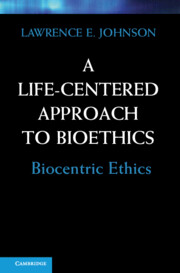Book contents
- Frontmatter
- Contents
- 1 Introduction
- Part I Backgrounds
- Part II Life, Death, and Bioethics
- 6 Being Alive
- 7 Being Healthy
- 8 Health and Virtue
- 9 Death and Life
- 10 Drawing Lines with Death
- 11 Double Effect
- 12 Concerning Abortion
- 13 The Gene, Part I
- 14 The Gene, Part II
- 15 Ethics and Biomedical Research
- 16 Bioethics Seen in an Eastern Light
- 17 Toward a Wider View
- Bibliography
- Index
16 - Bioethics Seen in an Eastern Light
Published online by Cambridge University Press: 05 June 2012
- Frontmatter
- Contents
- 1 Introduction
- Part I Backgrounds
- Part II Life, Death, and Bioethics
- 6 Being Alive
- 7 Being Healthy
- 8 Health and Virtue
- 9 Death and Life
- 10 Drawing Lines with Death
- 11 Double Effect
- 12 Concerning Abortion
- 13 The Gene, Part I
- 14 The Gene, Part II
- 15 Ethics and Biomedical Research
- 16 Bioethics Seen in an Eastern Light
- 17 Toward a Wider View
- Bibliography
- Index
Summary
Throughout our exploration of bioethics we have continuously had to take into account the fact that our approaches to solving bioethical issues, and therefore our conclusions, depend on our framework of assumptions and ways of thinking. We make assumptions, or presumptions, about whom and what we are as persons, about our relationships with others, and about what is good or bad for us. These are not matters in which we all have or start from just the same ideas. I have already remarked on the fact that particular cultures and societies not only offer different teachings on how life may be lived well or poorly but also provide differing environments with differing demands on how we are to live well.
I now attempt to elaborate on this and illustrate how some of the beliefs and ways of thinking originating in South and East Asia can reveal bioethical issues in a different light. I shall not attempt to give a full exposition of the Eastern system of bioethics. For one thing, there is no such thing as the Eastern system of bioethics any more than there is the Western system of bioethics. No more is there any such thing as the Eastern way of thinking any more than there is the Western way of thinking. To attempt to trace the many strands of Eastern thought as they apply to bioethical issues would be an immense and difficult undertaking, one that I lack the expertise to accomplish. My objective here is to highlight some of the major features in respect of which some leading Eastern ways of thinking often do differ from characteristically Western ones and to indicate how these tend toward differing ways of thinking about who we are with respect to those around us, about who we are within ourselves, and about the nature of our interests and the role of suffering in our lives. In doing so I will touch on a few further points about cultural differences as they touch on bioethical issues.
- Type
- Chapter
- Information
- A Life-Centered Approach to BioethicsBiocentric Ethics, pp. 335 - 350Publisher: Cambridge University PressPrint publication year: 2010



